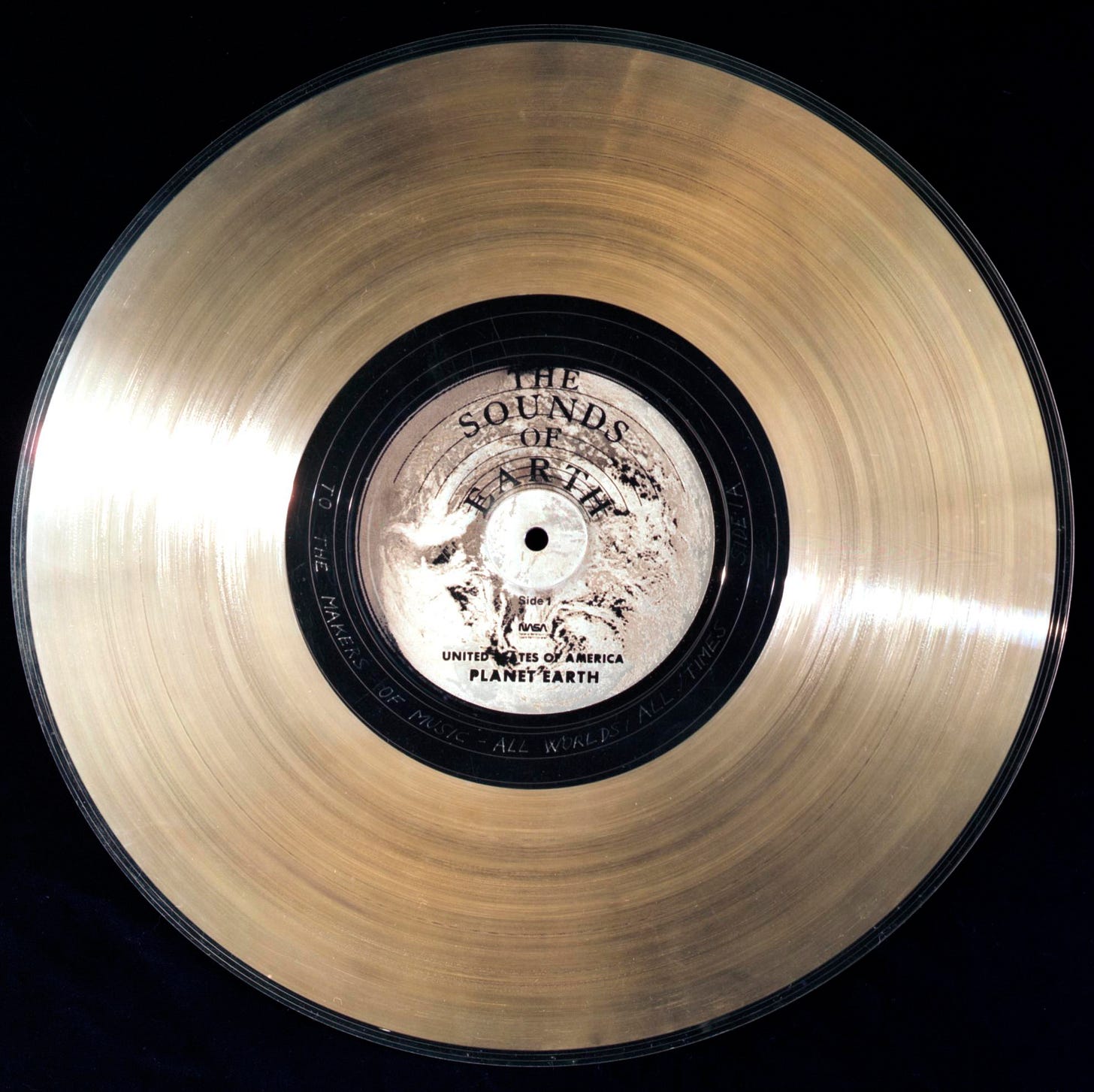Into The Universe
On Space Cowboys, Sonic Voyagers & The Cosmic Ocean
‘This is a present from a small, distant world, a token of our sounds, our science, our images, our music, our thoughts and our feelings. We are attempting to survive our time so we may live into yours’.
President Jimmy Carter
In 1977, NASA hired Dr Carl Sagan to oversee the compilation of two identical copies of a Golden Record, 90 minutes of music - described as ‘humanity’s mixtape for extraterrestrials’ by Pitchfork - to be launched into space on the two Voyager spaceships to represent life on Earth ‘The spacecraft will be encountered and the record played only if there are advanced space-faring civilizations in interstellar space, but the launching of this ‘bottle’ into the cosmic ‘ocean’ says something very hopeful about life on this planet.’ said Sagan.
The budget to produce the Voyager record was $18k - approximately $91k in today’s dollars - and alongside folk music from around the world featuring selections of bamboo pipes, shakahuchi, sitar, didgeridoo, gamelan and folk choirs, the team wanted to include ‘Here Comes The Sun’ by the Beatles. Though the artists approved, the copyright owners EMI immoveable asking price of $50k per record, per spaceship (approximately $500k total with amortisation) was impossible to accommodate.
Author Ann Druyan, the creative director of the curatorial team said in 2015: ‘Yeah, that was one of those cases of having to see the tragedy of our planet. Here's a chance to send a piece of music into the distant future and distant time, and to give it this kind of immortality, and they're worried about money ...’
Druyan was also absolutely determined that Chuck Berry's ‘Johnny B. Goode’ was included in the Golden Record selections, telling 60 Minutes in 2018: ‘...Johnny B. Goode, rock and roll, was the music of motion, of moving, getting to someplace you've never been before, and the odds are against you, but you want to go. That was Voyager.’ Despite being known for demanding large cash payments from promoters before he would play, Chuck Berry received the same two cents per copy for the two spacecrafts for universal rights as the rest of the copyright holders included on the Golden Record.
‘Dark Was the Night, Cold Was the Ground’, a 1927 blues instrumental with guttural low moaning by self taught trailblazing guitarist Blind Willie Johnson who used a pen knife as a slide, ‘It reflected an eternal part of the human experience … Since humans appeared on Earth, the shroud of night has yet to fall without touching a man or woman in the same plight’ Jack White has called the song ‘the greatest example of slide guitar ever recorded’. Heartbreakingly, Blind Willie’s death is attributed to exposure, after he caught cold sleeping on the cold wet ground of his burnt out church and never recovered.
Classical pianist Glenn Gould, described by the director John Waters as ‘ the ultimate original -- a real outsider’, recorded Bach’s ‘The Well Tempered Clavier’ for the Golden Record. Jazz pianist Brad Mehldau declares ‘Gould’s Bach is like watching Bach with 3-D glasses.’ In Otto Friedrich’s biography Gould is described as ‘one of history’s worst drivers’ and a story is recounted of how when he was pulled over for speeding in the countryside, he told the officer that he was ‘driving under the influence’ of a Mahler symphony that had consumed him so entirely he had to conduct with both hands as he drove.
I was fascinated to know why Louis Armstong’s ‘Melancholy Blues’ was chosen over ‘What A Wonderful World’ which seems a far more obvious choice and found a Wired article that explains it was an obsession of record collector/folklorist Alan Lomax, who believed it reflected a time when Armstrong ‘changed the direction of popular jazz music’. Armstrong, another mainly self taught musician, raised in poverty and sent to the Coloured Waif’s Home For Boys in New Orleans after being arrested aged 11, was truly a sonic voyager.
It strikes me that most of the music included on this Golden Record, carefully chosen by a team of scientists, producers and musicologists from many fields over a year, was created by players who were all outsiders or outliers in one way or another, and it seems meaningful to note that this deeply thoughtful collection reflects the best musical representation to communicate Earth’s humanity.
Another thing that strikes me is the lack of female representation in the known artists on the record but that is a sign of the times. It still seems like it would be an impossible task to condense a snapshot of the breadth of human music into 90 minutes.
Space and music both evoke a sense of wonder - of entering the great unknown. Songs inspired by space themes exist in their own universe, from the obvious to the obscure, evocative, ethereal, eccentric… here are some of my favourite space cadets, masters and mistresses of the Universe…..
Sun Ra and his Intergalactic Solar Orchestra - Somewhere In Space
David Bowie - Starman (and Life On Mars and Space Oddity etc - but I can’t choose them all!)
Elton John - Rocket Man
Spiritualized - Ladies & Gentlemen We Are Floating In Space
Deep Purple - Space Trucking
Holiday Sidewinder - Into The Universe
The Byrds - Mr Spacemen
The Only Ones - Another Girl Another Planet
Julie London - Fly Me To The Moon
The Beatles - Across The Universe
The Rolling Stones - 2000 Light Years From Home
S S Goodman - Space & Time
Black Sabbath - Into The Void
Jimi Hendrix - Third Stone From The Sun
Pink Floyd - Dark Side of the Moon (whole album)
Smog - Teenage Spaceship
Lou Reed - Satellite of Love
Wherever you may be on the space time continuum today, I hope your stars are aligning and shining, your planets are pulsating perfectly and all your rockets are launching …. x



